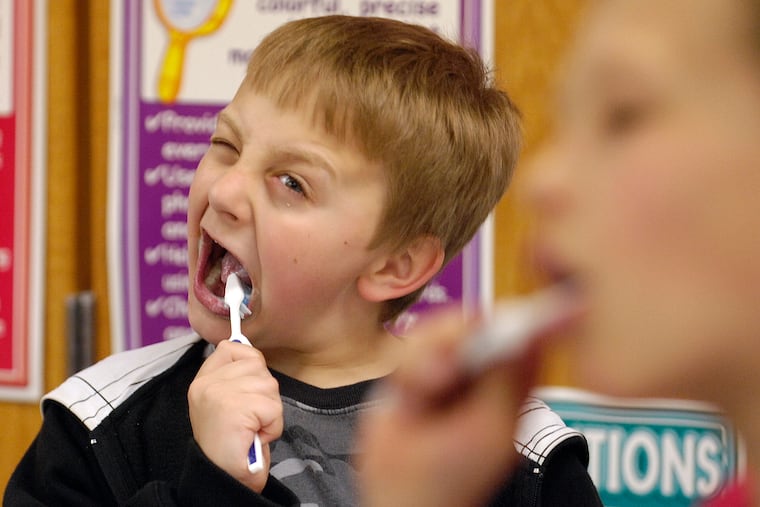5 health changes to try in the new year, according to experts
It’s resolution-setting season. And if tending to your health is one of your 2025 goals, here are some easy-to-implement tips we learned from experts this year to help you be healthier in the new year.

It’s resolution-setting season. And if tending to your health is one of your 2025 goals, here are some easy-to-implement tips we learned from experts this year to help you be healthier in the new year.
1. Skip the rinse after brushing your teeth
Viral TikTok videos have challenged the way many people brush their teeth. Their advice: Brush your teeth with a fluoride-containing toothpaste and spit — but don’t rinse.
Dental experts agree. They recommend brushing at least twice a day with a fluoride-containing toothpaste to help prevent cavities. And they say skipping the rinse after brushing allows the fluoride to stay on the teeth, providing added protection.
Those who prefer to rinse should rinse lightly with a small amount of water such as a sip from the hand or delay the rinse by about 20 minutes, said Brittany Seymour, a spokeswoman for the American Dental Association and an associate professor at the Harvard School of Dental Medicine.
2. Shampoo your hair regularly
The age-old dermatologic debate over daily hair-washing has been playing out on social media. Many users are discussing the benefits of alternating between regular shampooing and “no-pooing” — rinsing hair with shampoo alternatives such as apple cider vinegar, conditioner, or plain water to help maintain natural oils.
Dermatologists say it’s important to wash hair with shampoo, but there’s a balance.
Over-shampooing can dry out hair and make it more susceptible to breakage. Failing to wash your hair and scalp well can allow dead skin, oil, and styling products to accumulate and irritate the scalp, causing inflammation that may contribute to dandruff and even hair loss, said Carolyn Goh, a clinical associate professor of dermatology and founder of the Hair and Scalp Disorder Clinic at the University of California at Los Angeles.
On average, dermatologists recommend washing hair with shampoo every day to at least every two to three weeks, but it comes down to hair type, texture, age, and whether you use hairstyling products.
3. Drink more water, and sparkling water is just as good
Sparkling water contains the same compound essential for hydration as plain water: H2O.
But the two differ; sparkling water that is carbonated — naturally or artificially — contains dissolved carbon dioxide gas, which, through a chemical reaction, turns into carbonic acid, giving it that fizz.
“This does not interfere with the body’s ability to absorb water and stay hydrated,” said Grace Derocha, a registered dietitian nutritionist and spokeswoman for the Academy of Nutrition and Dietetics.
A 2016 study that examined hydration by 13 different beverages by comparing fluid intake with urine output found that not only was sparkling water just as hydrating as plain water, but it was also as hydrating as many other drinks, including coffee, tea, and soda.
In most cases, hydration comes down to how much liquid people drink, which, for many of us, is at least partly influenced by taste and texture.
“That’s where sparkling water, for some people, may have an advantage, because if you drink more, you’re likely to be better hydrated than if you drink less,” said Ron Maughan, lead author of the study and a professor at the School of Medicine at the University of St. Andrews in Scotland.
4. Try tart cherries for inflammation and pain
Tart cherries, particularly Montmorency cherries, and their juice contain antioxidants and have anti-inflammatory properties. And studies have shown that tart cherry juice may help prevent muscle damage after excessive or prolonged exercise, reduce pain for some people with fibromyalgia, and decrease inflammation for some people with osteoarthritis.
One randomized, double-blind, placebo-controlled trial of 54 healthy runners showed that athletes who drank tart cherry juice — one 12-ounce bottle twice daily for seven days before a race — to help prevent pain from muscle exertion had “a significantly smaller increase in pain” than those in the placebo group.
“The equivalency of the pain reduction was … about 800 milligrams of ibuprofen,” said Kerry Kuehl, an internist and chief of health promotion and sports medicine at Oregon Health & Science University, who led the study.
5. Give up alcohol to improve your sleep
You may want to rethink that nightcap. Research shows that even one or two beverages containing alcohol in the evening is associated with reduced-quality sleep.
Alcohol may help some people fall asleep faster, but, during the night, it can disrupt sleep patterns, “so you’re not getting the restorative sleep you would get without alcohol,” said Aaron White, the senior scientific adviser to the director of the National Institute on Alcohol Abuse and Alcoholism.
Also, once the alcohol wears off, there can be a rebound effect, causing some people to wake up early and have trouble falling back asleep, White said.